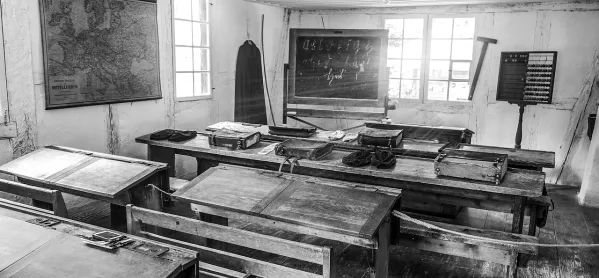We are having an immersive Victorian school day as part of this term’s topic. Year 2 boys are separated from the girls, are marched into class to find their desks rearranged into serried ranks and they pick their new name for the day at random from an envelope. Sir (in the shape of me) grapples with the Arthurs and Floras while the children get to grips with black sugar paper “slates” and chalk as teacher barks commands, waves a cane and introduces them to the dunce’s cap.
A hundred years of pedagogical thinking are abandoned as we learn by rote. The children repeat and write down by heart improving couplets and longer rhymes. Times tables are rattled briskly off from the board, everyone standing virtually to attention. We do exercise breaks at desks involving simple stretches and turns. They are actually quite effective, at least for this older LSA who could do with the odd stretch.
The regimen is also very effective behaviour control. This normally rambunctious bunch of 29 children is totally silent and compliant. I somehow expected them to rebel. Am I mistaken or is everyone actually producing their best handwriting on their “slates” at the first time of asking? They are not actually enjoying it are they? I know we keep repeating the mantra that “children should be seen and not heard”, but I wasn’t expecting it to be taken literally. This is the best behaved I’ve seen them since I joined in January. Is it just the novelty?
When the children come to write their reflections on the day, they rather liked it. They are also quite upset to find the desks rearranged the following day back to the “traditional” groupings. Weren’t they supposed to find the whole exercise intolerably oppressive and be grateful to be living in an enlightened age of 21st-century child-centred group learning?
Weren’t they also supposed to be horrified at the sheer humdrum roteness of it all? Even stripped of racial and sexual stereotypes, the worldview we are partaking in is surely abhorrent. Isn’t the takeaway supposed to be a revulsion at the methods and the poverty of the outcomes? Far from it, as far as my class is concerned.
Perhaps because we are in a school building built in 1887, where teaching like this actually happened, the answer is a little more nuanced. I start to question how different today’s methods are from the rote learning of yesterday. Especially when it comes to something like guided reading and parts of maths.
On reflection, the rhyme: “Good, better best/Never let it rest/Till your good is better/And your better best” seems quite a nice contraction of some of today’s wordy school mission statements. And driving the times table into the children was similar to - and just as as effective as - today’s methods.
And, of course, the late Victorians thought they were doing their best. Here’s Hugh B Philpott in a 1904 account of London Board Schools (as found on John Boughton’s Municipal Dreams blog): “It is real education - the drawing out of the child’s intelligence - not mere cramming for which the Board School stands. The wooden ways of teaching - the arithmetic by rule of thumb, the history that consists in learning strings of dates, the geography lesson that is a mere matter of memorising - all these have passed into the limbo of things superannuated and discredited.”
There is one major drawback to the old methods though. From a teacher’s point of view, the day doesn’t half drag. The 20 minutes before lunch were among the most tedious I have had in the classroom. My average morning normally careers headlong into the break. This one went at a snail’s pace. I’m pretty sure today’s children do access more knowledge and in more exciting ways. But even if they didn’t, modern day methods help to keep us grown ups sane.
David Hall is a learning support assistant and is applying to become a teacher after 25 years in communications. He tweets @campdavid




